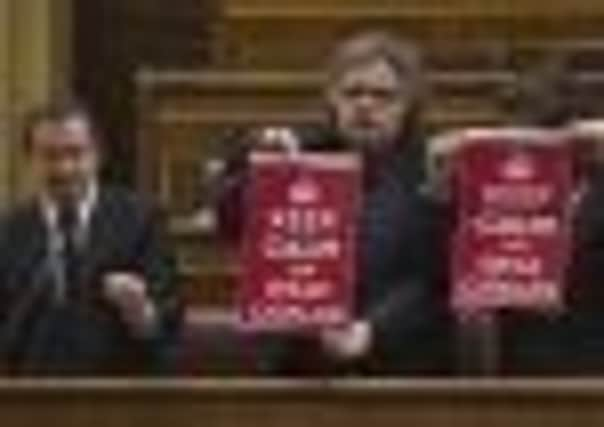Catalonia to hold vote on independence close to Scots poll in 2014


The Catalan vote will be a “consultation” and will have no legal status as referenda are outlawed under the Spanish constitution.
Artur Mas, the leader of the Convergència i Unió party who is clinging to power after suffering a humiliating defeat in last month’s election, has this week agreed to an early consultation on independence in exchange for the support of the second-place left-wing Esquerra Republicana de Catalunya (ERC) party. The deal means that Esquerra will not block Mr Mas’ investiture early in the new year.
Advertisement
Hide AdAdvertisement
Hide AdJust as 2014 marks 700 years since the Battle of Bannockburn, Esquerra has pushed for a year that is symbolic, though for unhappier reasons. It was in 1714 that Barcelona fell to Spanish forces and Catalonia was incorporated against its will into the Spanish state.
As an historical note, the attacking Spanish were led by the Earl of Berwick – while in 1314, Edward II gathered his forces at Berwick-upon-Tweed for the march north.
“A timetable creates limits and obligations,” yesterday said Oriol Pujol, the CiU general secretary. “The most important thing is to get the work done not just to hold a referendum but to get the desired result. What I will say is that it would be great to hold it in 2014, but that doesn’t mean we’ve settled on a date yet.”
To Catalonia watchers it may seem odd that Mr Mas has had his arm twisted to bring the date of the plebiscite forward, given that he campaigned on the independence issue, but one of the reasons he fared so badly last month is that voters don’t trust his secessionist credentials, which is why they voted for Esquerra leader Oriol Junqueras, who is unequivocal about independence.
In backing Mr Mas’ investiture, Esquerra will be rubber stamping his parliamentary programme, which includes a further €4 billion (£3.2m) in public spending cuts.
During the campaign, Mr Junqueras said his party would not support such cuts but faced with the option of power he has begun to equivocate, claiming that fewer cuts will be necessary if he wins concessions on inheritance and business taxes.
Alicia Sánchez Camacho, leader of the anti-independence federalist Popular Party in Catalonia, said she doubted the CiU/Esquerra pact would hold. “CiU will be hostage to Esquerra in all its decisions, Oriol Junqueras will be the shadow president.”
Esquerra will not enter into a formal coalition with CiU but sources say the two will sign a pact that will include clauses known only to the two parties.
Advertisement
Hide AdAdvertisement
Hide AdIn so far as it is a marriage, it is one entirely of convenience. There is little love lost between the two, and for Unió in particular, Esquerra is anathema. Esquerra was founded in 1931 when it declared a Catalan republic. Historically it is a left-wing socialist-nationalist party while CiU is the party of business and the middle class that arose out of the transition to democracy in 1978. Its strategy in 25 years in power has been to wring further concessions for Catalonia from minority governments in Madrid.
Just how the independence question will be worded is anyone’s guess but with no light at the end of Spain’s economic tunnel the appetite for separation is unlikely to abate.